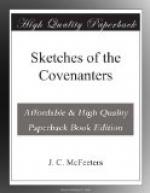The massacre at Bothwell Bridge brought upon the Covenanters extreme distress. Their sufferings hitherto had been as a continual dropping on a very rainy day, with fitful gusts striking here and there; now a hurricane sweeps the country, bringing ruin and desolation in its broad path. Every available force was put in operation for the utter annihilation of the Covenanters. Their ardor for Christ and His royal rights must be quenched in their blood, and their testimony to the truth must be silenced. The king, the courts, the army, the bishops—all were combined for the overthrow of the Presbyterian system of faith and the Covenant of God. Upon the ruins of the temple of liberty, erected by the Reformers, King Charles had determined to build his castle of absolute despotism. He knew that the glory of Christ’s supremacy would never fade out of the skies of Scotland, while Covenanters preached, prayed, and sang Psalms; nor would his despotism flourish while there were Covenanters to challenge his impious claim of authority over the Church, and iniquitous attempt to rule man’s conscience. Hence the desperate attempt to overawe and suppress them.
After the battle of Bothwell Bridge, the first stroke of excessive cruelty fell upon the 1,200 prisoners who had surrendered on the field. They lay all night upon the cold ground huddled together like sheep, surrounded by a strong guard. It was a night of horror. The sentinels watched every motion, and shot at any hand or head that dared to stir. In the morning they were marched from their mossy bivouac, leaving the green field dotted with crimson pools, and strewn with the dead who had received fatal shots; there they lay in garments rolled in blood.
The prisoners were tied together, two and two, and driven to Edinburgh, as cattle to the slaughter. The journey was dreary, during which they suffered from hunger, weariness, cruel mockings, and barbarous treatment. In the Greyfriars’ churchyard, there yet remains the small enclosure, into which these prisoners were driven like so many dumb animals. Here they were kept to await their sentence. Twelve hundred men, with scarcely comfortable standing room, without decent clothing, without sanitary accommodations, without proper food, without shelter, detained for months within these stone walls under a merciless guard—who can conceive of their sufferings? They had been stripped, all but naked; the hard ground was their bed; the sky was their roof; they were exposed to the heat of day, and the chill of night; the rains of July drenched them; the snows of November blanketed them.
During these wearisome months the number of prisoners constantly grew less, and mostly by melancholy means. Some of them subscribed a bond confessing themselves to be rebels and promising unconditional obedience to the king. The hardships of their condition, the threats against their lives, and the entreaties of relatives overpowered conscience. They were released only to be reproached, distressed, tormented, and pillaged at home, by the soldiers who overran the country. Their unholy bond sacrificed their peace with God, and brought no protection from man. Such is the effect of every compromise of God’s people with the world.




